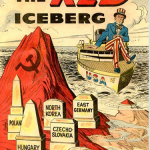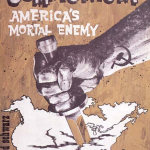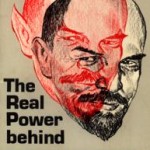Introduction
The Cold War was an expansive event that lasted for 46 years and saw many causes and effects. In an attempt to narrow this subject down, this guide will focus on just the 1950s decade of the Cold War. Having started in 1945, the war was just getting started in the 50s and over the course of the decade it would encounter many developments. It is important to look at this era specifically because, being as large a subject as it is, the beginning piece of the puzzle tends to get jumbled up and forgotten about. However, when researching the Cold War, it would be a detrimental mistake not to go back to the beginning. Most of the sources used in this guide are print sources from various academic books or journals, and most are primary. The guide is broken up into General Information, Hype, and Propaganda-these sections were chosen based on the stagnant nature of the Cold War, most of the information comes from what society thought was going to happen.
General Information
Dean Acheson, “Cannot Trust The Soviets” in The Cold War: Opposing Viewpoints, (San Diego: Greenhaven Press Inc. 1992), 81.
Dean Acheson, the Secretary of State under President Harry Truman, gave this speech in Berkley, California on March 16, 1950. It is a credible source of information about the Cold War and its’ effects because Acheson was an extremely successful and involved Politician and speaker. In this speech, Acheson emphasizes the importance of the US holding its’ ground against the Soviets. Although he believes America should negotiate for peace with Russia, he also states that America cannot risk its’ security in doing so. Therefore, he does not encourage placing too much trust in the Soviet Union. Many other people of the time, including political figures, agreed with this stance. The Truman Doctrine and the Marshall Plan, which Acheson helped to develop, also related to this speech. Acheson had a very strong viewpoint on the way the US should interact with the Soviet Union during the Cold War. He believed America should tread lightly and not get too involved with the USSR.. Overall, this speech was meant to get Americans to be wearier of Soviets and more focused on containment.
Robert Beisner, Dean Acheson: A Life in the Cold War, (New York: Oxford University Press, 2006).
In his book about Secretary of State Dean Acheson, Robert Beisner gives a relevant and informed look at life during the Cold War. Beisner talks about the hostilities and paranoia of the American people of this time and the effect that had on the government, and the other way around. Beisner is writing about Acheson and therefore shares his viewpoint on most topics. The intended audience of this book is any modern day American looking to learn more about the Cold War and everyday life in the 1950s.
John Lewis Gaddis, The United States and the Origins of the Cold War, (New York: Columbia University Press, 1972).
John Lewis Gaddis’ book focuses on the causes leading up to the Cold war and the early years of the war. Although communist resentment and hysteria really thickened during the Cold War, Gaddis points out that it existed even before the war officially started. Gaddis’ viewpoint favors the Americans and does not waver. The audience for this book is any American who wants to know more about the hostility towards the soviets and the reasons for it.
William G. Hyland, The Cold War, (New York: Random House, 1990).
William Hyland is a credible source as an author on the topic of the Cold War because he himself served in the ranks of the Cold War. Hyland further proves to be a good source of information based on his successful career as a foreign policy analyst. The main purpose of this text is to lay out what exactly happened in the great expanse of the Cold War. Specifically in the 1950s, Hyland discusses the return of Winston Churchill and his new idea, NATO. He also touches on the Austrian State Treaty of 1955 and the first post war summit in Geneva, also in 1955. Hyland’s main purpose is to explain the Cold War and its’ happenings to all ages of Americans.
Hype
O.K. Armstrong, “Communism Must Be Destroyed” in The Cold War: Opposing Viewpoints, (San Diego: Greenhaven Press Inc. 1992), 84.
O.K. Armstrong, a Missouri representative, gave this speech on February 22, 1952. This speech is a credible primary source because it not only represented the way Armstrong—a respected member of Congress—felt, it tells of a very popular opinion of communism of that time. The main purpose of this speech is to convince other Americans that this, the way Armstrong feels, is the way other Americans should feel about communism. That is, that there is no good thing that can come out of it and America cannot contain it but should try and destroy it or freedom will cease to exist all over the world. Armstrong has a very clear viewpoint and bias that he favors an active, aggressive attack against communism, as opposed to the more passive containment policies of the time. Overall, Armstrong and many other Americans urged the government to do something more than just contain communism.
Joint Chiefs Of Staff Of the US Armed Forces, “The United States Should Develop the Hydrogen Bomb” in The Cold War: Opposing Viewpoints, Ed. William Dudley, (San Diego: Greenhaven Press Inc, 1992), 121.
The Joint Chiefs of Staff of the US Armed Forces issued this report to the Atomic Energy Commission on January 13, 1950. The purpose of this report was to inform the Atomic Energy Commission that they believed it would be best for America to build a hydrogen bomb. They thought this largely because in the event of an attack, they wanted to have something to either threaten their opponent with or retaliate with. This is the kind of hysteria that Americans like I.F. Stone worked to reduce. The Joint Chiefs of Staff all shared the same viewpoint that America must be ready for an attack before one comes. They believed offense was the best kind of defense. Overall, they wanted to protect America before it had any reason to need protecting.
Irving Kaufman. “The Rosenbergs on Trial” in The Cold War: A History In Documents. Ed. Allan M. Winkler, (New York: Oxford University Press Inc, 2000), 56-58.
This source is the court sentence to Ethel and Julius Rosenberg for suspect of espionage. They were found guilty by Judge Irving Kaufman for a crime worse than murder, according to Judge Kaufman, and sentenced to death by the electric chair. Judge Kaufman was a very respected Judge and his decision was backed throughout all the levels of appeals the Rosenbergs tried to attain. This sentence was read to them on April 5, 1951 and their death was ordered for May 21st of that year. This sentence serves as a viewpoint of the time period that was extremely hysteric with the Red Scare. The Rosenbergs, among other people, were made an example out of to show that the US does not play around with communists.
Joseph R McCarthy, “The State Department Is Infested With Communists” in The Cold War: Great Speeches In History, Ed. Louise I. Gerdes, (Farmington Hills: Greenhaven Press, 2003), 51-58.
Joseph McCarthy is an extremely well known Senator who caused a lot of noise and upset with his outlandish, accusatory way of politics. In this particular speech by McCarthy, he establishes what will later become known as McCarthyism. This term stems from his outrageous suspicion of communists in the American government, particularly within the State Departments. His main point in this speech is to uncover the hidden communists in the United States Government and warn the American people of communism’s awful consequences. Up until McCarthy, no one else had come close to the kind of hysteria and paranoia he caused. He has a very defined viewpoint, believing that everyone has the potential to be a hidden communist and that it was his and the American public’s job to find out who was. Overall, McCarthy tried to exercise all the communists out of the American government, whether there were any or not.
I.F. Stone, “America Needs Subversion” in The Cold War: Opposing Viewpoints, Ed. William Dudley, (San Diego: Greenhaven Press Inc, 1992), 101.
I.F. Stone was a well known Journalist in Washington D.C. who gave this speech in March, 1954. Stone’s main point was to call out Senator George McCarthy for being responsible for all the Cold War hysteria and misinforming people so that they were rooting for detrimental things instead of focusing on what could actually be done to help America and the people of the USSR.. Overall, in this speech, Stone tries to bring Americans back to the real issues and what they can actually do to help.
Propaganda
“The Wild West Is Where I Want To Be”
Songwriter Tom Lehrer was known for his sarcastic, jovial criticisms of nuclear testing in the 1950s. He was by far the most creative critic, who used songs—which he sang and played the piano for himself—to draw attention to the negative effects of nuclear testing. His first song in 1953 entitled “The Wild West Is Where I Want To Be” predicted that life in the future would include wearing lead suits under clothes to protect people from the radioactivity in the air and in the ground. The main purposes of his songs were to draw negative attention to the government’s atomic bomb testing legislation. He sarcastically makes nuclear testing sound fun in order to point out just how detrimental it would be to all Americans and the fate of the country.
This source is a compilation video of many different American propaganda strategies used during the Cold War.
This website has numerous examples of the way propaganda was utilized for the Cold War in the 1950s and later.


